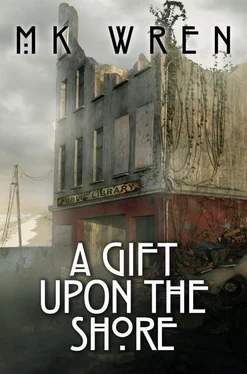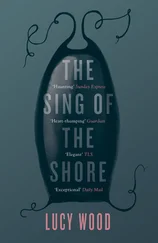He rises, goes to the railing, keeping his back to me, and again I wait, for the first time afraid. When at last he turns, his eyes fix on me with a gaze so full of fear and doubt I’m hard-pressed not to look away.
“Miriam told me something after morning service.”
Miriam. Of course.
“What did she tell you?”
“She said Rachel was an unbeliever.”
Rage is my first response to that, and I feel the chill of pallor in my face. How did Miriam know that? Has she been reading my diaries?
I almost laugh at that explanation, at the thought of Miriam purloining my diaries, poring over them in secret, trying to decipher my writing, laboriously spelling out each word.
No, the explanation is undoubtedly far more straightforward: to call Rachel an unbeliever was simply the worst thing Miriam could think of to say against her. She didn’t care about the truth or falsity of her accusation.
And it is immaterial why she chose that particular blade to cut the bonds between Stephen and me. She chose her weapon well, however inadvertently. In these people’s lexicon, unbelief and evil are synonymous. I needed time to prepare him for this, to teach him that there are many answers to the question of the existence of a god. But Miriam has forced the issue, and the damage she’s done may be irrevocable. I can’t lie to Stephen. Not now, with his dark, seeking eyes fixed on me. He would recognize a lie.
I ask, “Did you wonder why Miriam told you that?”
“Yes. But it doesn’t matter, does it? I mean, if it’s not true.”
“It matters. But not as much as what you feel about it. Obviously it bothers you a great deal. Does it frighten you?”
He starts to answer negatively, then pauses to think about it and says, “Yes, I guess it does.”
“Why?”
“Because I thought Rachel—I mean, everything you told me about her made me think she was good and wise and brave, but now…” The chagrin in his voice almost overwhelms his words. “It isn’t true, is it? Rachel wasn’t an unbeliever.”
He seems to be begging for a comforting lie. No, he is begging for a comforting truth, and I can’t offer it to him. I rise, take a step toward him, then stop, feeling his tension. He doesn’t want me to touch him.
“Everything I told you about Rachel was true, Stephen. She was good and wise and brave. But there was one thing I didn’t tell you. I didn’t think you were capable of dealing with it yet. And I was right.”
He stiffens, perhaps stung by that. “Then what Miriam said—it’s true, isn’t it? Rachel was… an unbeliever.”
And finally I must answer, “Yes.”
He is stunned by that syllable, staring at me as if I’d betrayed him, just as Jerry stared at me with incredulous accusation only a few days ago. But I can feel no anger for Stephen as I did for Jerry. I can only feel myself betrayed.
“Stephen, what you believe about god is your concern. It is your right as a human being to believe anything that makes sense to you. And it was Rachel’s right to believe what made sense to her . If her beliefs don’t agree with yours, does that negate her goodness, her wisdom, or her courage?”
He is as close to weeping as I am, but he won’t give in to tears. He stands facing me, rigid and trembling, his voice thick. “But if she didn’t believe in God…”
“What? Does it follow inevitably that she was evil? That’s the way Miriam thinks, the way she wants everyone else to think.”
“And you—what do you think? Are you…”
He can’t speak the words. He wants to know if I’m an unbeliever, too. Oh, Miriam, how unerringly your blade has gone to the jugular.
“Stephen, what difference does it make what I believe? I’ve never asked you to believe the way I do, any more than Rachel asked me to believe the way she did. I just want you to…”
But he is past hearing what I want, what I hope for him. He stares at me as if he had never seen me before, and I know I’ve lost him.
My scholar, my hope for humankind. My heir. As much my son as the infant who died in my womb. I’ve lost him.
“I have to go help Jeremiah,” he says coldly.
And I stand helpless, wordless, while he walks away from me.
In the vacuum he leaves, I clutch the railing for support, and the pain I feel now is shaped like grief and is of the same substance.
There have been times in my life when I knew that if dying were easy, if I had only to let go and slip into that sleep past dreams, I would do it. This is such a time, and age has eroded my will; I feel no resilience in body or mind. I am too brittle and fragile to withstand the shearing stress of this grief, of this defeat.
But dying is seldom easy, and even at the nadirs of despair, I always had a compelling rationale to hold on to life. My aching hands grasp the railing, and behind my closed eyes I seek the rationale that will give me a hold on life, on hope, at this moment.
What I find, finally, is stubborn pride. Will I spend my last years in defeated despair, or will I risk them for the shreds of hope?
Will I surrender to Miriam?
I straighten, look out at the sun-spangled sea, and I laugh, bitterly, on the edge of weeping.
Miriam, you’ve won another battle, but I still will not surrender.
That means I must begin my preparations for the next battle. My eyes are dry as I leave the deck and go to my room. I replace Luke’s letter in its box in my souvenir drawer. My pulse beats hard and slow in my ears, and I feel a hint of the familiar constriction in my chest.
When I emerge into the greenhouse again, Bernadette is at her worktable transplanting seedlings into pots. She turns and studies me with narrowed eyes. “Stephen’s lesson over so soon?”
I only shrug. “I’m going for a walk on the beach.”
She presses dirt around a seedling with her small, strong fingers, nodding absently. “Take care, Mary.”
When I leave the greenhouse, I call Shadow, then make my way down to the beach, with Shadow trotting ahead of me. I go south, but only as far as the old beach access where the bank is low, and I can make my way easily up to North Front Road. I follow it past the ruins of the Acres house back toward Amarna. Once I leave the remains of the asphalt, there isn’t much left of the road into Amarna. The gravel is buried in moss; alders and bracken fern encroach on the margins, leaving only the tracks of our wagon wheels. I pass the gate at Amarna quickly, hoping no one there sees me, and walk up the quarry road until I come to the trail that leads to the tree. It seems fitting that my preparations should begin there.
At length, I reach the tree and sit down on the bench. I feel Stephen’s absence here, and I lock my hands together, accepting the pain to focus my thoughts away from him. I look up at the granitic column of the tree, savoring its monumental silence, gathering strength out of my memories.
Finally I call Shadow from her explorations. She comes to me panting, plumed tail waving.
“Shadow, speak!”
She knows that command and responds with three sharp barks. They seem brazenly loud in this domain of quiet. I lean down to pet her. “Good girl, Shadow, good girl.”
Next I pull the silent whistle out from under my collar. It wheezes softly as I blow on it, but what Shadow hears makes her dance with confused excitement. The whistle means come here , but she’s already here . I blow on the whistle again and say, “Speak, Shadow!”
For the next two hours—what I judge to be two hours by the movement of the shadows around me—I continue the lesson, working with her for a few minutes, then letting her go to explore or find water at the Styx, which murmurs unseen in the jungle of elderberry and fern. Then I whistle her back, repeat the lesson, and before this training session is over, she not only comes for the whistle, as she always did, but I usually hear her bark before she appears. But she isn’t consistent, and I must have consistency in this. My life may depend on Shadow.
Читать дальше












